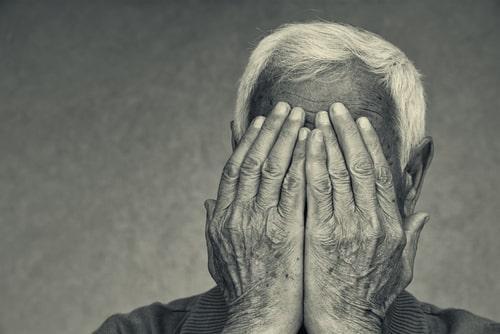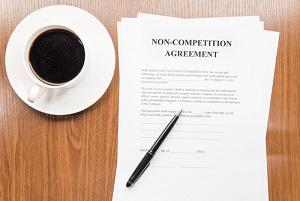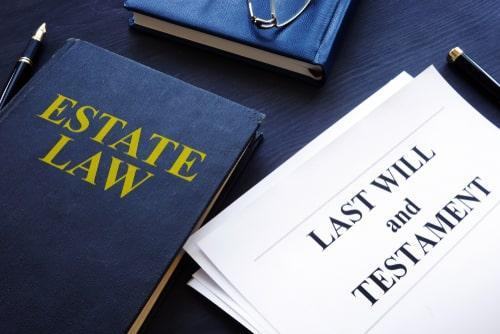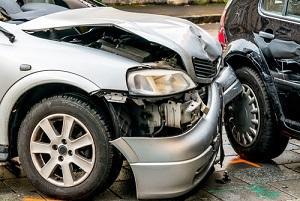Recent Blog Posts
Investigation Finds Nursing Homes Targeting Family and Friends to Collect on Residents’ Debt
Posted on August 02, 2022 in Estate Planning
 At Mandelbaum Barrett PC, we encourage all of our clients to make sure they have an estate plan in place, no matter what their level of income and assets are. Estate planning not only includes having tools in place that will address issues when you have passed, such as having a will and naming an executor, but there are also steps you can take that will address elder care issues. Not only will these steps protect the assets you do have, but they can also help protect your loved ones from unscrupulous nursing homes that attempt to collect nursing home debt from residents’ family members.
At Mandelbaum Barrett PC, we encourage all of our clients to make sure they have an estate plan in place, no matter what their level of income and assets are. Estate planning not only includes having tools in place that will address issues when you have passed, such as having a will and naming an executor, but there are also steps you can take that will address elder care issues. Not only will these steps protect the assets you do have, but they can also help protect your loved ones from unscrupulous nursing homes that attempt to collect nursing home debt from residents’ family members.
Nursing Home Debt Collection
A recent investigation into medical debt by Kaiser Health Network (KHN) and National Public Radio (NPR) found that one in seven adults who have medical debt have been threatened with lawsuits and even jail by the creditors they owe bills to. This aggressive collection technique has spilled over into the nursing home industry, which has made it part of their collection process to harass family and friends of residents, trying to collect unpaid debt from them, despite the fact that there are federal laws in place protecting family members from just this type of activity.
Continue Reading ››
Should I Start a Business or Buy a Franchise?
Posted on July 28, 2022 in Business Law
 There are numerous advantages to being a business owner. For example, it can be disheartening to work for another person or company. You may feel unappreciated by your superiors or frustrated at the inefficient way you are expected to do your job. When you own a business, you get to be your own boss. You control how your business is operated and managed.
There are numerous advantages to being a business owner. For example, it can be disheartening to work for another person or company. You may feel unappreciated by your superiors or frustrated at the inefficient way you are expected to do your job. When you own a business, you get to be your own boss. You control how your business is operated and managed.
However, owning a business also comes with a great deal of responsibility and liability. You may need to spend a tremendous amount of time and resources for only marginal growth—especially at first. If you are thinking about becoming a business owner, two options you may be considering are buying into a franchise or starting your own business. There are benefits and drawbacks to both of these choices, all of which should be fully researched before you make a commitment to either path.
Continue Reading ››
Tips for Avoiding Bicycle Accidents and Injuries
Posted on July 19, 2022 in Personal Injury
 Whether you ride for exercise, commuting, running errands, or all these reasons, bicycling can be a great, healthy form of transportation. While the infrastructure for bicycling has grown in the past few decades, bicyclists remain vulnerable users of the transportation system. Unfortunately, when a bicyclist has an accident with a motor vehicle, there is a high likelihood of serious injuries and even death. Working with an experienced bicycle crash injury attorney can help you recover compensation from an accident.
Whether you ride for exercise, commuting, running errands, or all these reasons, bicycling can be a great, healthy form of transportation. While the infrastructure for bicycling has grown in the past few decades, bicyclists remain vulnerable users of the transportation system. Unfortunately, when a bicyclist has an accident with a motor vehicle, there is a high likelihood of serious injuries and even death. Working with an experienced bicycle crash injury attorney can help you recover compensation from an accident.
Getting There Safely on a Bicycle
Injuries sustained by riders in a bicycle accident can be severe, including broken bones, head injuries, traumatic brain injuries, spinal cord injuries, and other catastrophic injuries. As a victim of a bicycle crash, you may be entitled to compensation. In many cases, the bicycle rider will not be at fault, but will still suffer the pain of injuries sustained in the crash.
Continue Reading ››
Is My Non-Compete Agreement Fair?
Posted on June 20, 2022 in Business Law
 For many companies in today’s business environment, protecting their business practices and proprietary information is of paramount importance. Many new employees will be asked to sign a non-compete agreement to prevent them from leaving and working for a competitor or starting up their own business using their previous company’s sensitive information. However, there are limits on what a non-compete can cover. Before you sign a non-compete, it is best to fully review the scope and restrictions that the agreement places on future employment if you decide to leave the company.
For many companies in today’s business environment, protecting their business practices and proprietary information is of paramount importance. Many new employees will be asked to sign a non-compete agreement to prevent them from leaving and working for a competitor or starting up their own business using their previous company’s sensitive information. However, there are limits on what a non-compete can cover. Before you sign a non-compete, it is best to fully review the scope and restrictions that the agreement places on future employment if you decide to leave the company.
Details to Understand in a Non-Compete Agreement
As you are starting at a new company or taking on a role with more responsibility at your current employer, you may have questions about how a non-compete agreement may impact your future employment prospects. Items that are commonly included in non-compete agreements that you should fully understand before signing it include:
Continue Reading ››
Driving Tips to Stay Safe in a Thunderstorm
Posted on June 02, 2022 in Car Accidents
 Warmer weather in the spring and summer often brings the risk of severe weather, including thunderstorms. If you are out on the road in a thunderstorm, you want to drive safely for yourself and others on the road to prevent a car accident. Here are some safe driving tips that can reduce the likelihood that you will be in a car crash.
Warmer weather in the spring and summer often brings the risk of severe weather, including thunderstorms. If you are out on the road in a thunderstorm, you want to drive safely for yourself and others on the road to prevent a car accident. Here are some safe driving tips that can reduce the likelihood that you will be in a car crash.
Prevent Accidents Before and During Your Trip
Although you cannot control the behavior of other drivers on the road, there are some actions you can take before and during your drive that can help keep you safe. By following these tips and driving conservatively, you are more likely to avoid an accident.
- Maintenance – To be well prepared for any severe weather when driving, you can take certain actions before you pull you even get on the road. Make sure you have a clean windshield and well-functioning wiper blades to increase your ability to see the road and other road users. Inspect your tires to make sure the tread is not overly worn and that they are properly inflated. Worn or underinflated tires can lead to poor handling, especially on wet roads.
Continue Reading ››
Reasons You Need to See a Doctor Following a Car Accident
Posted on May 20, 2022 in Car Accidents
 According to statistics collected by the National Highway Traffic Safety Administration (NHTSA), a car accident occurs in the United States every 60 seconds. This comes out to more than five million accidents every year.
According to statistics collected by the National Highway Traffic Safety Administration (NHTSA), a car accident occurs in the United States every 60 seconds. This comes out to more than five million accidents every year.
Almost two million victims are injured in these crashes, many of them seriously. Tragically, there are many victims who do not even realize they have been injured following a crash because of delayed symptoms. By the time they realize there is a problem, it can be extremely dangerous – even fatal.
Delaying medical help not only puts your health in jeopardy but can also have a negative impact on any lawsuit you bring forward against the at-fault driver. Their insurance company could use that delay in diagnosis as a way to get out of paying you the financial compensation you deserve. Our car accident attorneys have dealt with many insurance companies who have attempted to accuse the victim that they are not really injured or that they were really injured somewhere else, after the accident occurred.
Continue Reading ››
What Is Employment Discrimination Under Federal Law?
Posted on May 05, 2022 in Business Law
 These days, the job market can be highly competitive, with an abundance of experienced, highly qualified candidates all vying for the same position. Employers have the right to be specific in what they want in an employee, and to cast a wide net before choosing the person they think would be best suited for the job. At the same time, basing marketing practices and hiring decisions on applicant characteristics, such as age, race, or gender, or refusing jobs to otherwise qualified candidates due to their physical attributes or disabilities are examples of job discrimination that can land a company in legal hot water.
These days, the job market can be highly competitive, with an abundance of experienced, highly qualified candidates all vying for the same position. Employers have the right to be specific in what they want in an employee, and to cast a wide net before choosing the person they think would be best suited for the job. At the same time, basing marketing practices and hiring decisions on applicant characteristics, such as age, race, or gender, or refusing jobs to otherwise qualified candidates due to their physical attributes or disabilities are examples of job discrimination that can land a company in legal hot water.
Discrimination is prohibited not only for current employees, but also in the procedures and practices employers use in filling positions. The Equal Employment Opportunity Commission (EEOC) advises that the following are five areas in which discrimination often occurs. If you think your experience falls under one of these areas, contact an experienced employment attorney for legal assistance.
Continue Reading ››
An Alarming Spike in Pedestrian Accidents
Posted on April 27, 2022 in Personal Injury
 National statistics reveal that there has been a significant increase each year in the number of pedestrian accidents that occur across the country. There has also been a rise in the number of pedestrian fatalities, as well. In 2020, more than 6,500 victims were killed in pedestrian accidents, an increase of almost 5 percent from the year before. What makes these numbers even more concerning is that the number of vehicle miles traveled (VMT) was down by more than 13 percent from the year before due to the pandemic.
National statistics reveal that there has been a significant increase each year in the number of pedestrian accidents that occur across the country. There has also been a rise in the number of pedestrian fatalities, as well. In 2020, more than 6,500 victims were killed in pedestrian accidents, an increase of almost 5 percent from the year before. What makes these numbers even more concerning is that the number of vehicle miles traveled (VMT) was down by more than 13 percent from the year before due to the pandemic.
Although everyone is at risk of being a pedestrian accident victim, multiple studies have found that there are certain factors that cause that risk to spike. Knowing what those factors are can help you to protect yourself from being a victim. The following are the most common factors.
Age
Both older adults and children are most at risk of being hit by a vehicle. Tragically, one in five children younger than 14 years of age who were killed in auto accidents was a pedestrian. And for the past five years, 20 percent of pedestrian accident victims who were killed were 65 years of age or older.
Continue Reading ››
Why Everyone Needs an Estate Plan
Posted on April 15, 2022 in Estate Planning
 No matter what your financial situation is, you have an estate. Your estate is made up of everything you own. Many people think this only includes real estate, bank accounts, retirement accounts, stocks, etc., and therefore, if they do not have these types of assets, they do not have an estate.
No matter what your financial situation is, you have an estate. Your estate is made up of everything you own. Many people think this only includes real estate, bank accounts, retirement accounts, stocks, etc., and therefore, if they do not have these types of assets, they do not have an estate.
However, an estate also includes your furniture, personal possessions, vehicle, and even your digital property, such as music and photographs. The bottom line is that no matter how modest your estate is, you should still have an estate plan in place to specify what should be done with these items when you die. The following are some of the components you may choose for your estate plan.
Last Will and Testament
Wills can still be a useful tool in estate planning. If you have young children, you are able to name the party or parties you wish to be your children’s legal guardian. A will allows you to address how you want personal belongings, collections, furniture, digital assets, and other property to be divided among your heirs, as well as which relatives you do not want to receive anything.
Continue Reading ››
The Most Common Causes of Connecticut Car Accidents
Posted on March 29, 2022 in Car Accidents
 Statistics show that the majority of drivers will be involved in at least three car accidents during their “driving lifetime.” All too often, a safe and courteous driver finds themselves the victim of someone else’s negligence on the road. Car accident victims can suffer any number of personal injuries and property damage, and Connecticut law says they deserve to be compensated for their medical expenses, lost wages, pain and suffering, and more.
Statistics show that the majority of drivers will be involved in at least three car accidents during their “driving lifetime.” All too often, a safe and courteous driver finds themselves the victim of someone else’s negligence on the road. Car accident victims can suffer any number of personal injuries and property damage, and Connecticut law says they deserve to be compensated for their medical expenses, lost wages, pain and suffering, and more.
There are many reasons why drivers are negligent behind the wheel. Some of the most commonly cited causes for vehicle accidents include the following.
Distracted Driving
Distracted driving is one of the leading causes of vehicle accidents in this country. While it is illegal to text and drive, many people still do it anyway and end up causing car accidents, leaving victims with serious and fatal injuries.
But fiddling with a cellphone is not the only way that a driver could be distracted while behind the wheel. Drivers could be distracted by others in the vehicle with them (i.e., children talking, talking passengers, dog barking, etc.), eating or drinking while driving, or searching for items that are on the floor, in the glovebox, or are in a purse or backpack.
Continue Reading ››


 At Mandelbaum Barrett PC, we encourage all of our clients to make sure they have an estate plan in place, no matter what their level of income and assets are. Estate planning not only includes having tools in place that will address issues when you have passed, such as having a will and naming an executor, but there are also steps you can take that will address
At Mandelbaum Barrett PC, we encourage all of our clients to make sure they have an estate plan in place, no matter what their level of income and assets are. Estate planning not only includes having tools in place that will address issues when you have passed, such as having a will and naming an executor, but there are also steps you can take that will address  There are numerous advantages to being a
There are numerous advantages to being a  Whether you ride for exercise, commuting, running errands, or all these reasons, bicycling can be a great, healthy form of transportation. While the infrastructure for bicycling has grown in the past few decades, bicyclists remain vulnerable users of the transportation system. Unfortunately, when a
Whether you ride for exercise, commuting, running errands, or all these reasons, bicycling can be a great, healthy form of transportation. While the infrastructure for bicycling has grown in the past few decades, bicyclists remain vulnerable users of the transportation system. Unfortunately, when a  For many companies in today’s business environment, protecting their business practices and proprietary information is of paramount importance. Many new employees will be asked to sign a
For many companies in today’s business environment, protecting their business practices and proprietary information is of paramount importance. Many new employees will be asked to sign a  Warmer weather in the spring and summer often brings the risk of severe weather, including thunderstorms. If you are out on the road in a thunderstorm, you want to drive safely for yourself and others on the road to prevent a
Warmer weather in the spring and summer often brings the risk of severe weather, including thunderstorms. If you are out on the road in a thunderstorm, you want to drive safely for yourself and others on the road to prevent a  According to statistics collected by the National Highway Traffic Safety Administration (NHTSA), a
According to statistics collected by the National Highway Traffic Safety Administration (NHTSA), a These days, the job market can be highly competitive, with an abundance of experienced, highly qualified candidates all vying for the same position. Employers have the right to be specific in what they want in an employee, and to cast a wide net before choosing the person they think would be best suited for the job. At the same time, basing marketing practices and hiring decisions on applicant characteristics, such as age, race, or gender, or refusing jobs to otherwise qualified candidates due to their physical attributes or disabilities are examples of
These days, the job market can be highly competitive, with an abundance of experienced, highly qualified candidates all vying for the same position. Employers have the right to be specific in what they want in an employee, and to cast a wide net before choosing the person they think would be best suited for the job. At the same time, basing marketing practices and hiring decisions on applicant characteristics, such as age, race, or gender, or refusing jobs to otherwise qualified candidates due to their physical attributes or disabilities are examples of  National statistics reveal that there has been a significant increase each year in the number of
National statistics reveal that there has been a significant increase each year in the number of  No matter what your financial situation is, you have an
No matter what your financial situation is, you have an  Statistics show that the majority of drivers will be involved in at least three
Statistics show that the majority of drivers will be involved in at least three 






